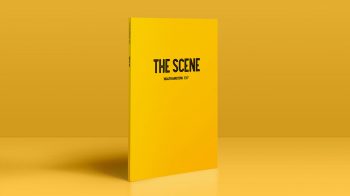Is Audi, Skoda’s ‘better connected’ uncle?
If you like the way we think click to say hello:
07712 270 198 / adrian@adriansableandhawkes.co.uk
It’s a pretty damning indictment if you describe someone as having no personality.
They may have many great qualities but generally we avoid spending time with someone we they find boring. And it is our character and personality that significantly contribute to the relationships we all have.
In a nutshell, brand personality is the way that companies create genuine relationships with their customers.
Without these essential elements of ‘human’ engagement, the relationship a customer has with a product retains no loyalty beyond price and performance. And in most markets and sectors, there are many products to choose from that can deliver in a given price range.
So what is a personality?
Our personality is the summation of our beliefs, attitudes and qualities that together form our individual distinctive character.
These ‘characteristics’ include how we view life, which rules we choose to guide us through life, our ‘get up in the morning’ moods (are you half pint full or half pint empty?), how we approach work and play; make, manage and break friendships; earn and lose trust; engage, enrage, amuse and love.
Conversely, a brand’s personality is that set of ‘human’ characteristics that are deliberately attributed to a company, brand name, product or service.
Definitions over, here’s fun, just between us
Lets take a business or two and imagine it as a person – what personality would that person have?
We may as well start at the top, with Apple’s brand personality. Imagine Apple to be our mate, what would they be like? Creative, innovative, stylish? The cool kid or maybe the style nerd? They’d be the friend that was always immaculately turned out, always with the latest kit, not big on the outdoors but still at the cutting end of fashion, always buying on style and function, never on price.
As an aside, these observations will vary for the multi-national brands, across borders and cultures. Did you know, in Italy, Spain, and the UK, the iPhone is viewed as a seductress, but in Australia it is a joker, and in Japan, a dreamer. This differences highlight the many factors that influence a brand’s personality. Not only do consumers experience a brand’s marketing activities in light of their own values, traditions, and circumstances, but they also perceive personality traits through the lens of their cultural conditioning.
And what of our other friend Nike? Nike will always encourage you to get some air, get outside, run that extra mile. The training partner who won’t let you off the hook, tells you the truth but always the eternal optimist who sees every scenario as a test of wills, and a challenge of the spirit. What you won’t find is Nike lying on the couch, making excuses or taking the weekend off.
And if you believe the research
According to research there are five main types of brand personality: excitement, sincerity, ruggedness, competence and sophistication.
Examples of traits for the different brand personalities are:
- Excitement: boundary-pushing, spirited, youthful, challenging (Instagram, Fitbit, Spotify)
- Sincerity: genuine, kind, family-oriented, thoughtful (Unilever, Patagonia, Lego)
- Ruggedness: tough, outdoors, freedom-loving, adventurous (GoPro, Under Armour. Lonely Planet)
- Competence: successful, accomplished, influential, a leader (Apple, The Economist, Innocent)
- Sophistication: elegant, prestigious, exclusive. (BMW, Rolex, Gucci)
Is a brand personality useful?
Well d’ah. But let’s work through it. According to Interbrand’s 2018 Best Global Brands report the answer if unequivocal and hugely profitable. In the reports top spot, Apple’s brand value grew 16% year on year to $214.5bn – the first time the $200bn mark has been surpassed. In second place, Google was up 10% to $155.5bn, while Amazon, valued at $100.8bn, retained third place, up 56% and the fastest-growing brand on the list. Microsoft at number four (valued at $92.7bn) and Coca-Cola ($66.3bn) complete the top five. Well conceived, considered clear and consistently delivered brands make money.
And one of the key reasons for this is explained by Christian Purser, chief executive of Interbrand London: “Leading brands are more customer-obsessed than ever, bringing the voice of the customer into every aspect of their business, making bold moves and taking calculated risks based on customer understanding. The fastest-growing brands across the last five years of the study are typically the most relevant to people’s lives and the most responsive to their changing needs.”
We know that brands and brand value last, and are more sustainable than the corporate financials that underpin them. This, in a nutshell, is the reason why brands are so valuable and why brands with successfully managed personalities increase a brand’s value way beyond simply communicating traditional functional benefits.
They do this in a number of ways. Where products have similar attributes and functions, brand personality can provide genuine differentiation, and can be used to define and distinguish a product’s class, its context and price. Classic examples are cars: Mercedes vs Ford, BMW vs Skoda. They may all make a four-door family saloon but personality branding differentiates them.
Brand personality can bring richness to product’s communications. If a product is presented only in terms of an attribute or function there are few meaningful associations beyond ‘yes it does what I need it to do’. Nike makes trainers but they are now as much about an attitude, as much a cultural icon, as they are about leisure footwear.
Finally, the notion of brand personality helps us gain greater understanding of how our target consumers perceive us. In the multi-channel age we live in, reactions and opinions can provide much more insight than simply recording sales performance vs price and technical attribute.
In summary
Not all brands have a personality, or at least a strong, distinctive personality. Those that do, have significant advantages in terms of standing out from the crowd, bearing a message and improving relationships with customers.
Brand personality, like human personality, it is both differentiating and enduring, and, once established, it will provide long-term benefits. Creating, supporting and developing a personality should form a key part of a brand’s vision and strategy.















